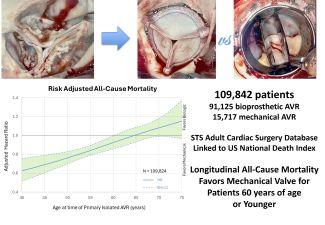LOS ANGELES—January 25, 2025—A late-breaking study presented today at the 2025 Society of Thoracic Surgeons (STS) Annual Meeting reveals that mechanical aortic valve replacements (AVRs) provide significant long-term survival benefits for patients aged 60 and younger compared to bioprosthetic valves. The study, leveraging data from the STS Adult Cardiac Surgery Database (ACSD), offers the most comprehensive analysis to date of prosthetic valve outcomes, encompassing over 100,000 patients.
The study addressed a critical question in cardiac surgery: how age and valve type influence outcomes for patients undergoing surgical AVR. It found that patients aged 60 and younger had lower all-cause mortality with mechanical valves.
Key Findings Include:
- Decline in mechanical valve use: Despite superior outcomes in younger populations, mechanical valve use decreased from 20% to 10% over the study's 12-year period.
- Survival advantage: Mechanical valves were independently associated with a lower risk of all-cause mortality in patients 60 years or younger.
- Robust methodology: The study utilized comprehensive patient-level data from the STS ACSD and the National Death Index, ensuring precise, validated insights.
“The decision between a bioprosthetic and mechanical valve is one of the most consequential for patients requiring aortic valve replacement,” said Michael Bowdish, MD, lead author of the study and a cardiothoracic surgeon at Cedars-Sinai Medical Center in Los Angeles. “Our research underscores that for patients with an age threshold of 60 years, mechanical valves confer a significant survival advantage. This data will help patients and providers make more informed choices about their care.”

This study also highlights how advancements in surgical techniques and data analytics are improving the ability to tailor treatment plans to individual patients. “By linking the STS database with the National Death Index, we have a powerful tool to analyze long-term outcomes, paving the way for more personalized and effective care,” Dr. Bowdish added.
The findings are particularly relevant considering the increasing adoption of bioprosthetic surgical valves in many patients and the recent trend of bioprosthetic transcatheter aortic valve replacement (TAVR) in younger populations without clear evidence. The current study challenges this practice trend given this important evidence favoring the durability and survival benefits of mechanical valves in patients aged 60 and younger.
"Current practice has gradually evolved to implanting bioprostheses in patients of younger and younger age. This activity has not been informed by randomized trials or national clinical data, but by experiential practice or by state or administrative claims data,” said Vinay Badhwar, MD, West Virginia University, and senior author of the study.
“With national clinical evidence from over 100,000 patients and over 10-year survival follow-up, the signal of the survival benefit of mechanical valves starts at age 65 but is most clear at age 60 or younger. This new important information may give surgeons and cardiologists some pause when suggesting biological solutions to younger patients," added Dr. Badhwar. "While care must always be individualized between the patient and provider, perhaps lifetime management in these particular patients may be better served with a mechanical prosthesis to mitigate the non-trivial mortality and morbidity risk of reoperation or reintervention and to optimize long-term survival.”
The ACSD is part of the STS National Database, one of the largest and most comprehensive clinical registries with nearly 10 million cardiothoracic procedures performed by 4,300+ surgeons. With over 95% of adult and congenital cardiac surgery procedures and a majority of lung cancer and esophageal cancer surgery in the U.S., the data and outcomes from the STS Database specialty registries provide true national benchmarks for clinical outcomes of cardiothoracic surgery.
About STS
The Society of Thoracic Surgeons is a not-for-profit organization representing over 7,800 surgeons, researchers, and allied healthcare professionals worldwide who are committed to improving outcomes for patients undergoing cardiothoracic surgery.